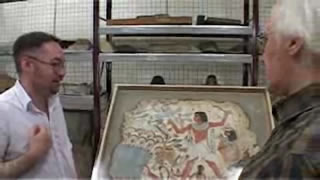3.1 A hierarchical society
Egyptian society, like its most famous monuments (and like virtually all pre-modern societies after the paleolithic) was pyramidal. While there was some scope for social mobility, there was not much. And unlike contemporary globalised capitalism, driven by a relentless dynamic of transformation and innovation, Egypt was driven by an overwhelming imperative to keep things stable, to preserve order, and prevent a descent into chaos. In fact the very notion of an ‘Egyptian’ identity seems to have involved a reflection of the environment they inhabited: being defined against the threat of surrounding chaos, both natural in the form of the desert, and social, in the form of hostile neighbours.
At the head of human society was the king, the ‘Pharaoh’. The king occupied a unique position in that, although human, he was also divine. He was the single point of contact between the world of humankind and the world of the gods. To the virtue of the king alone fell the task of preserving what was termed ‘maat’, meaning balance, order and harmony in human affairs.
Watch this video in which Richard Parkinson and Paul Wood talk about the hierarchy of ancient Egyptian society.

Transcript
The king was assisted by an administrative elite, including such all-powerful figures as a vizier and a treasurer who oversaw the running of the main offices of the state: justice, religion, the economy, the army. These were duplicated at regional levels. Egypt was divided into 42 nomes (provinces), each of which had its own administration with figures responsible for the various walks of life in their own areas. Within these geographical areas a similar sort of hierarchy held sway: in the top levels, literate administrative figures such as Nebamun, keeping the day-to-day organisation going. Below that was a layer of tradesmen and skilled craftsmen, including those who would work on the decoration of a private tomb-chapel. Below that again there was the majority of the population: the mass of workers, including those who worked on the land, either with crops or animals, as well as fishermen, and many servants.
